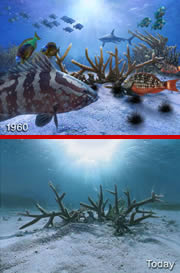|
Troubled waters exposed
Web campaign spotlights endangered ocean life.
25th February 2003
Nature - science update
KENDALL POWELL
Website reveals coral damage between 1960 (top)
and today (bottom).
Artwork: Illusion Arts
Documentaries portraying teeming life beneath the ocean
create a deceptively rosy impression. That's the message
in a new campaign from a group of filmmakers and
scientists.
Called "Shifting baselines: the truth about ocean decline", the project uses a website showing Hollywood footage, animation and scientific commentary to reveal the damage hidden beneath the waves.
The campaign's leader, Los Angeles-based filmmaker Randy Olson, says that there has not been a conspiracy to suppress this message - rather, poor public education has prevented it from getting out. "More than a quarter of all coral reefs are now dead and the majority of the world's fisheries are in severe decline," he says.
"Scientists and environmentalists should feel a responsibility to communicate the truth," says Olsen. The website, www.shiftingbaselines.org, made its public debut on 24 February.
Deep distress
The campaign's name, "Shifting baselines", describes the phenomenon in which each generation perceives ocean life as abundant, even though it has declined slowly and steadily for several hundred years.
Also called "old-timer syndrome", it represents the difference between an experienced scuba diver recognizing a damaged spot and a new one impressed by its underwater beauty. This means that environmentalists striving to restore wildlife levels to 1980 levels, for example, may be underestimating the ocean's maximum potential.
Visitors to the website can view then-and-now animations depicting marine decline, and a slideshow outlining the shifting baseline problem. The site is sponsored by The Ocean Conservancy, a conservation group in Washington DC, as well as the Scripps Institution of Oceanography in La Jolla, California, and the Surfrider Foundation, an environmental group based in San Clemente, California.
The site also draws on the expertise of moviemakers such as Gale Anne Hurd, producer of deep-sea thriller The Abyss. She brought in animators who used Hollywood special effects to recreate underwater ocean scenes from 1960.
Ocean cinematographers say that it has become increasingly difficult to find the beautiful underwater scenes that most people think of as the norm. Footage of dead coral doesn't make good entertainment, they say. "We see so many pretty pictures, we're lulled into a false sense of security," says Hurd.
In fact, the final episode of the BBC's popular ocean documentary Blue Planet - one which dealt with humankind's impact on the ocean - was aired separately from the rest of the series in Britain, and was not shown at all in the United States. This was a "missed opportunity", says marine biologist Callum Roberts at the University of York, UK, whose work featured in the episode.
Roberts and other scientists hope that the new campaign will help the public to recognize the importance of ocean conservation. If humans continue to fish intensively, they warn, eventually only small creatures such as jellyfish, plankton and bacteria will remain.
The campaigners are encouraging viewers to support the establishment of marine reserves. Otherwise, "there will be an increase in the areas called dead zones and collapse of coral reefs and fisheries", warns Jeremy Jackson, a marine ecologist at the Scripps Institution.
Top
|
